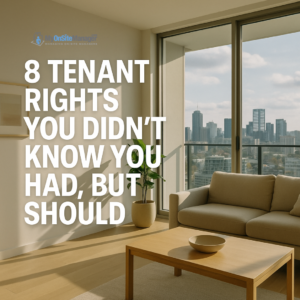Renting a home is often seen as a straightforward exchange—you pay rent, your landlord provides a place to live. But in reality, there’s a complex web of laws that protect tenants, many of which go unnoticed until a conflict arises.
According to a recent Architectural Digest feature, housing attorneys like Faizah Malik and Josh Krefetz have seen too many renters lose money or endure poor living conditions simply because they didn’t know their rights. These protections exist to keep housing fair, safe, and equitable, and in many cases, they can save renters hundreds—or even thousands—of dollars.
Here’s a breakdown of eight lesser-known tenant rights that could make a huge difference in your rental experience.
1. Application Fees Have Legal Limits
When applying for a rental, landlords may charge application or screening fees—but those fees are often regulated by state law.
-
California: Capped at about $62.02 (adjusted annually for inflation).
-
New York: Limited to $20 and must be waived if you can provide a recent background or credit report.
-
Other states: Many restrict fees to actual processing costs.
Tip: If you’re charged more than your state’s legal limit, request a refund in writing and cite the law.
2. Your Right to Privacy Is Protected
Your rental is your home, and the law recognizes your right to “quiet enjoyment.” That means landlords can’t just show up unannounced.
-
In most states, they must give at least 24 hours’ notice before entering, except in emergencies like fire or flooding.
-
Entry must be during reasonable hours—not at night unless agreed upon.
Tip: If a landlord enters without permission outside of emergencies, you may be entitled to file a complaint or take legal action.
3. You May Withhold Rent for Serious Health or Safety Issues
If your home becomes unsafe or unlivable—think broken heating in winter, pest infestations, or major plumbing failures—state laws may allow you to withhold rent until repairs are made.
-
Many jurisdictions require giving written notice and a reasonable repair window (often 30 days).
-
Some allow you to hire your own repair service and deduct the cost from rent (“repair and deduct” rule).
Tip: Always document the problem with photos and written communication before taking this step.
4. Natural Disasters Can Impact Your Rent Obligations
If a natural disaster—like a hurricane, earthquake, or flood—forces you to leave your home or makes it unsafe, you may not be required to pay rent for that time.
-
In some cases, rent is prorated for the days you can’t stay there.
-
Certain states, like Massachusetts, require landlords to offer relocation assistance (e.g., $750).
Tip: Review your lease to see how it addresses “force majeure” or disaster clauses.
5. Security Deposits Have Maximum Limits
Security deposits help protect landlords from damage costs, but states limit how much they can ask for.
-
California: Usually capped at one month’s rent (1.5 months if you have a waterbed).
-
Other states: Most follow a one-to-two-month rent cap.
Tip: If your landlord demands more than the legal limit, you can refuse or request a refund.
6. Landlords Must Justify Deposit Deductions
When you move out, your landlord can’t just keep part of your deposit without explanation.
-
Many states require a written, itemized list of deductions within a set time (often 21–30 days).
-
Some also require photo or video evidence of damages.
-
In certain states, you can request a walkthrough inspection to address issues before moving out.
Tip: Do your own photo/video documentation when moving in and out.
7. You Might Be Allowed to Stay After Your Lease Ends
When your lease expires, you’re not always required to leave right away—especially in cities with tenant-friendly laws.
-
For example, Los Angeles requires landlords to provide a legal reason for non-renewal in many cases.
-
Without “just cause,” you may be able to continue renting month-to-month.
Tip: Check your local tenant protection laws before assuming you have to move.
8. “Self-Help” Evictions Are Illegal
Landlords cannot change your locks, shut off your utilities, or physically remove your belongings to force you out.
-
Such actions—known as self-help evictions—are illegal in most states.
-
In some places like Florida, tenants may receive up to three times their rent in damages if this occurs.
Tip: If you face an illegal eviction, contact local tenant advocacy groups or legal aid immediately.
Why Knowing Your Rights Matters
Many tenants only learn about these protections after they’ve lost money, endured unsafe living conditions, or faced an unlawful eviction. Understanding your rights from the start puts you in a position of strength, not vulnerability.
Practical steps you can take:
-
Educate yourself on local and state housing laws (they vary widely).
-
Read your lease carefully and note anything that conflicts with your legal rights.
-
Document everything—conversations, repairs, problems, and agreements.
-
Seek help early—tenant rights groups, legal aid, and government agencies can all be valuable allies.
Source: “8 Surprising Tenant Rights You Might Not Know You Have” – Architectural Digest

